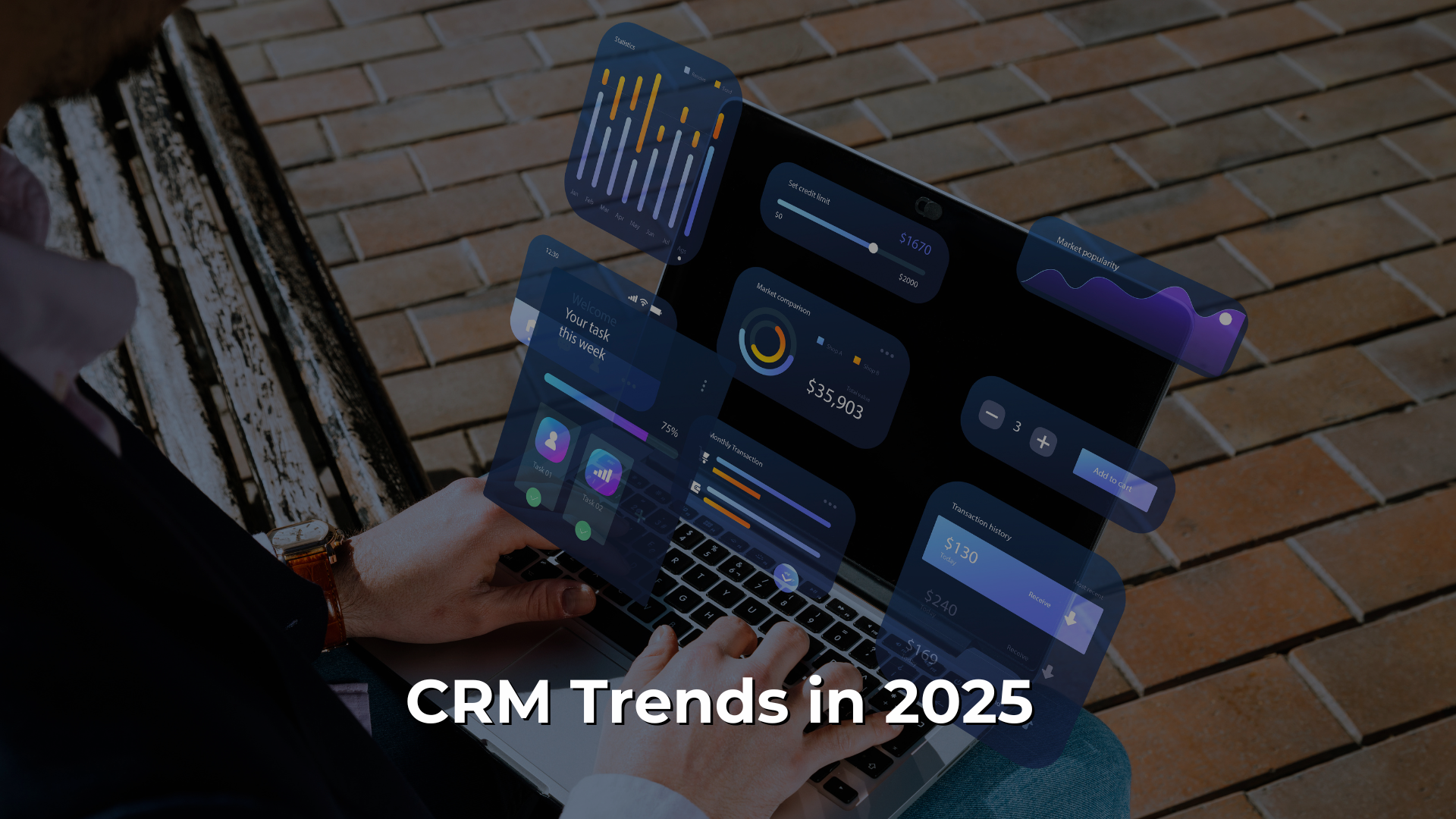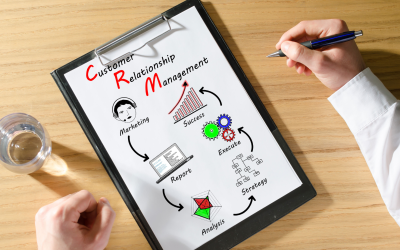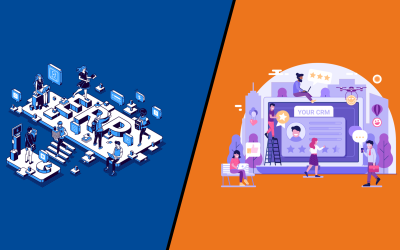The goal of the newest CRM trends is to improve customer relationship management by using innovative technologies. These include the usage of blockchain technology for safe data transactions, the integration of artificial intelligence for more intelligent data processing and personalized customer interactions, the use of voice-to-CRM solutions for enhanced user experiences, and many more.
CRM is entering a new era of innovation, and it is playing a significant role in coordinating customer service, sales, and marketing teams. CRM promises to change customer experiences by improving data sharing, collaboration, and communication.
These developing CRM trends represent a larger industry shift toward more dynamic, flexible, and customer-centric CRM solutions that can adapt to the changing demands of organizations and their clients.
The Beginning and evolution of CRMs
The journey of Customer Relationship Management (CRM) software showcases a remarkable transformation from simple tools to sophisticated platforms that drive modern business strategies. In its early days during the 1970s and 1980s, CRM relied on manual processes like Rolodexes and physical records, later evolving into basic database marketing systems. The 1990s marked the emergence of modern CRM with solutions like ACT! and Siebel Systems, which integrated contact management, sales, and marketing into unified platforms. The early 2000s brought a revolution with the advent of cloud-based CRMs, pioneered by Salesforce, making these tools accessible, scalable, and cost-effective.
The following decade saw the integration of Artificial Intelligence (AI) and mobile capabilities, enabling predictive analytics, automation, and on-the-go accessibility for sales and support teams. By the 2020s, CRMs had transformed into omnichannel platforms focused on delivering seamless customer experiences, integrating email, social media, chat, and other communication channels. Today, CRM software emphasizes personalization, customer journey insights, and real-time decision-making, supported by AI and customizable, integrated ecosystems. This evolution has solidified CRM’s role as an indispensable tool for fostering strong relationships, improving customer retention, and driving business success in a highly competitive, customer-centric world.
Why are businesses using CRM software?
CRM software is the digital marketing tool with the quickest rate of growth, and for good reason. Numerous studies show how CRM software can promote the expansion and success of companies of all sizes. Let’s look at the information:
- Conversion rates can be increased by 300% with CRM software.
- Purchasing a CRM platform is one of the top sales goals for 13% of businesses.
- CRM solutions have the potential to strengthen customer interactions by 74% and boost customer retention by 27%.
- The worldwide CRM industry is expected to reach $82 billion by 2025.
- CRM systems are currently used by 91% of companies with more than 11 employees.
- CRM software can enhance report accuracy and sales forecasting by 42%.
- Companies can decrease lead expenses by 23% by using a CRM.
CRM Trends to look for in 2025:
1. AI in CRM:
AI integration in CRM systems is transforming customer relationship management by employing advanced technology to improve numerous parts of the customer journey. CRM solutions can now predict customer behaviour, automate answers, and customize interactions across every point of interaction thanks to AI-powered analytics.
The primary advantage of CRM AI trends is their capacity to automate routine processes that have historically been performed by marketing and sales personnel. Artificial intelligence (AI) algorithms can now effectively handle tasks like marketing content creation, customer call transcription, and data summarization, freeing up critical time for human staff to concentrate on more important projects.
Furthermore, by automating operational operations and repeating procedures, AI elevates standard business process automation (BPA). This enhances productivity and makes it possible for businesses to expand their operations more successfully.
Data analytics is another important way AI is being used in CRM. Salespeople may find unexplored areas and make wise judgments by using AI’s predictive analytics on business outcomes, which are derived from the analysis of enormous volumes of customer data. Employees are empowered by this predictive ability to foresee client wants and adjust their strategy accordingly.
Additionally, AI-driven CRM systems provide natural language processing, allowing users to interact with the platform through conversational interfaces. This enables salespeople to use common language to ask the system for advice or insights, such as suggestions or help with intricate procedures. In a similar vein, clients may easily submit support requests and describe their problems by interacting with chatbots driven by AI.
2. Blockchain for CRM:
Blockchain for CRM is a modern approach that completely transforms the way customer data is used, saved, and maintained in CRM systems. Blockchain technology guarantees that every transaction and client contact is permanently documented using a decentralized and cryptographically secure ledger.
Consider a retail business that uses blockchain technology in its CRM to securely and transparently record every customer interaction, including purchase history and personal information. This creates the foundation for a more personalized and reliable consumer experience while also protecting data from intrusions.
The repercussions are significant. More security, better data integrity, and more customer trust are all possible outcomes for firms that integrate blockchain technology with CRM systems. This combination indicates a time when CRM systems will be excellent at building sincere, enduring connections with customers in addition to handling data.
To put it briefly, blockchain-based CRM solutions mark a significant change in how businesses manage client information, value privacy, and foster loyalty.
3. Voice to CRM Solution:
By using this method, businesses can easily collect, store, and evaluate consumer data from phone calls, improving their marketing, sales, and customer service tactics. Voice to CRM technology also improves processes for sales organizations by removing the need for manual data entry, resulting in increased data accuracy and empowering sales people to achieve better sales results.
For example, a sales professional can use voice commands to update client information while on the road, guaranteeing accuracy and saving time. In a similar vein, customer service representatives can automate standard questions, offering prompt response and improving the client experience in general.
With systems that anticipate demands and provide predictive insights, the future of speech technology in CRM offers even more efficient and customized customer contact.
4. VR & AR in CRM:
One quickly developing trend in customer relationship management (CRM) is the implementation of virtual reality (VR) and augmented reality (AR) into CRM systems. This creative combination improves customer experiences, accelerates sales procedures, and gives companies insightful data about consumer behavior.
Personalized product demos are among the top uses of AR and VR in CRM. Businesses can use augmented reality (AR) technology to generate product visualizations or virtual showrooms that are customized for each customer’s tastes, empowering them to make well-informed purchasing decisions. Virtual reality (VR) can also be used for remote sales presentations, which enables sales teams to show off items to clients wherever they may be in the world.
Additionally, predictive analytics features provided by AR and VR in CRM help companies foresee the wants and demands of their clients. Businesses can learn more about consumer behavior and adjust marketing efforts by examining user interactions in virtual worlds. This data-driven strategy increases sales and income while also improving customer happiness.
AR and VR in CRM appear to have a bright future. The boundaries between the real and virtual worlds will become increasingly blurry as technology develops, leading to even more immersive and participatory experiences. Furthermore, combining AR and VR with advanced technologies like AI and machine learning will transform consumer engagement tactics and result in more meaningful and customized experiences.
5. The start of Edge Computing:
In CRM, edge computing is the decentralized processing of data at or close to the data creation source, as opposed to depending on a centralized cloud infrastructure. One of the most recent developments in CRM is the ability for CRM systems to process data closer to the point of generation, which lowers latency and enhances real-time analytics.
CRM systems can boost overall performance, increase scalability, and provide faster response times by using edge computing. For example, in a smart retail store, edge computing can improve how inventory systems work with sensors on shelves. Instead of sending data about stock levels to a central server, edge computing lets the system process the data locally. When stock gets low, the system can instantly alert staff to restock or adjust pricing. This makes the store run more efficiently and ensures customers always find what they need.
For example, in a smart retail store, edge computing can improve how inventory systems work with sensors on shelves. Instead of sending data about stock levels to a central server, edge computing lets the system process the data locally. When stock gets low, the system can instantly alert staff to restock or adjust pricing. This makes the store run more efficiently and ensures customers always find what they need.
The future of edge computing in CRM provides enormous opportunities for innovation and growth. For CRM systems to manage the rising amount of data in real-time, edge computing will become more and more essential as IoT devices continue to multiply and produce enormous volumes of data.
6. Cybersecurity as a Rising CRM Trend:
Customer relationship management (CRM) systems’ cybersecurity has grown from a secondary to a key issue. The significance of data security and privacy compliance has been emphasized by the development of laws like the California Consumer Privacy Act (CCPA) and the General Data Protection Regulation (GDPR). These rules provide customers more control over their personal data in addition to imposing stringent criteria for data processing and protection.
Organizations are forced to strengthen their defenses against possible breaches and unauthorized access to sensitive data due to the growing sophistication and frequency of cyber-attacks. Businesses must embrace a comprehensive security strategy that goes beyond simple protections like firewalls and antivirus programs.
This involves developing comprehensive security policies, which include rigorous staff training on data privacy best practices, as well as installing advanced monitoring systems capable of proactively recognizing and neutralizing threats.
Choosing a CRM provider becomes a key decision that is supported by the business’s commitment to strong security procedures. The stakes are particularly higher for sectors like healthcare that are subject to certain laws. Standards such as the Health Insurance Portability and Accountability Act (HIPAA) are not only advantageous but also required in these industries.
For example, an online pharmacy uses a CRM system to manage customer prescriptions, orders, and communication. Due to the sensitive nature of health-related data, the CRM incorporates advanced security measures like encryption and two-factor authentication to protect information. It also uses role-based access controls, ensuring only authorized staff can view or modify sensitive records. This setup ensures compliance with regulations like HIPAA and fosters customer trust by safeguarding their data from unauthorized access or breaches.
Whether it’s a CRM for online pharmacies, telemedicine platforms, healthcare providers, insurance companies selling health policies, or eCommerce stores selling medical supplies, robust data security and compliance measures are essential.
7. Hybrid CRM Solutions:
One of the newest developments in CRM is the hybrid solution, which combines the advantages of on-premises and cloud-based systems to provide a flexible approach. Businesses looking for cloud solutions’ scalability and accessibility while retaining the protection and management of on-premise infrastructure are catered to by this strategy. Hybrid CRMs allow businesses to use the cloud for better collaboration, scalability, and cost-efficiency while also storing sensitive data on their own servers for increased security and regulatory compliance.
A financial organization subject to stringent data sovereignty and privacy requirements is one example of a compelling use case. Through the implementation of a hybrid CRM, this organization can use cloud capabilities for analytics and customer service improvements while maintaining sensitive client data on-premise to keep up with regulatory requirements. A retail chain that uses the cloud for consumer interaction and loyalty programs and the on-premise component for safe transaction processing and inventory management is another example.
Because of the growing demand for safe and adaptable data management procedures, hybrid CRM systems appear to have a bright future. Hybrid CRMs stand out as a smart option as companies in all sectors deal with rising cybersecurity risks and the need for scalable, affordable solutions. Custom hybrid solutions that are suited to particular industry demands and legal frameworks and provide a balance between operational effectiveness and strict data security are predicted to become more prevalent.
8. Expanding Social CRM:
By integrating social media channels into CRM platforms, social CRM, or social customer relationship management, allows companies to interact with clients more directly and intimately. Businesses can develop a complete picture of their customers and improve communication and personalization by integrating their social media interactions—such as comments, conversations, and feedback—into the CRM system. Using social media platforms to track and address customer service complaints is one of the main applications of social CRM.
For instance, a traveler facing issues with their hotel booking might contact the company via Instagram. With a social CRM system, the hotel can instantly identify the traveler, review their booking details and past interactions, and respond promptly—all within the same platform. This not only simplifies customer service but also showcases the hotel’s dedication to resolving issues quickly and publicly, enhancing its reputation for excellent service.
Targeted marketing is another example of how social media and customer relationship management software can be integrated. Businesses that analyze social interactions and engagements can tailor their marketing efforts to specific client preferences, habits, and comments, resulting in customized campaigns. For example, a consumer who often tweets about sustainable items can be targeted with advertisements and promotions for a company’s eco-friendly product range.
The future of social CRM is set for further integration and automation. As AI and machine learning technologies evolve, social CRM solutions will improve their ability to analyze social media data, forecast consumer behavior, and automate answers. This will allow for ever more specific client interactions and proactive customer care, converting social media from a basic communication channel to an integral part of the customer experience.
9. Mobile CRM:
Mobile CRM, also known as CRM mobile app, is a CRM product that is optimized for mobile devices like as smartphones and tablets. Mobile CRM allows sales, marketing, and customer care teams to access client data via a mobile CRM app or a web-based browser using cloud CRM.
This flexibility enables real-time access to customer information, sales data, and different CRM tools required for on-the-go operations, improving the capacity to do business anywhere and at any time.
A prime use case of mobile CRM involves real estate agents who are often on the move. For example, an agent meeting a potential buyer at a property can instantly access the buyer’s preferences, previous interactions, and budget details directly on their mobile device.
This real-time access to customer information allows the agent to provide tailored property suggestions, address questions on the spot, and update client preferences instantly, leading to more engaging interactions and higher chances of closing the deal.
It appears that mobile CRM will witness even more substantial developments in the future. With the integration of AI and machine learning, mobile CRM systems will provide predictive analytics, providing insights into customer behavior and sales forecasting. Furthermore, the integration of IoT devices will give sales teams with additional data sources to better understand and anticipate consumer demands.
10. The need for self-service CRM:
Self-service CRM is a strong expansion of conventional customer relationship management that allows customers, employees, and partners to access information, address issues, and complete activities independently via an online portal. This method eliminates the need for direct communication with customer service or business personnel by using technology to expedite interactions and transactions.
For example, a customer named Sarah wants to track her online order. Instead of contacting support, Sarah logs into the self-service portal, navigates to the order tracking section, and instantly sees the real-time status of her shipment. This convenient interaction saves Sarah time and reduces the need for customer support intervention, making it efficient for both her and the company.
CRM self-service portals are projected to grow increasingly complex and integrated into corporate operations as we go deeper into the digital age. In the future, self-service CRMs will be able to anticipate client demands and provide proactive solutions in addition to managing standard questions and transactions.
Wrapping It Up:
As we come to the close of our research into the newest developments in customer relationship management, it is clear that the field is changing quickly due to both shifting consumer habits and technology breakthroughs. Many CRM systems are focusing more on automation, customization, new connectors, and database centralization in the hopes of standing out as the CRM systems of the future. Businesses will need to remain ahead of the quickly evolving CRM market more than ever in the coming years. They can stay competitive, maximize expenditure, provide better client experiences, and eventually increase earnings by using the most recent advancements in CRM software.





![The best way to examine and analyze a CRM software development proposal [5 elements + 5 criterias]](https://twisterautomation.com/wp-content/uploads/CRM-SOFTWARE-DEVELOPMENT.png)
